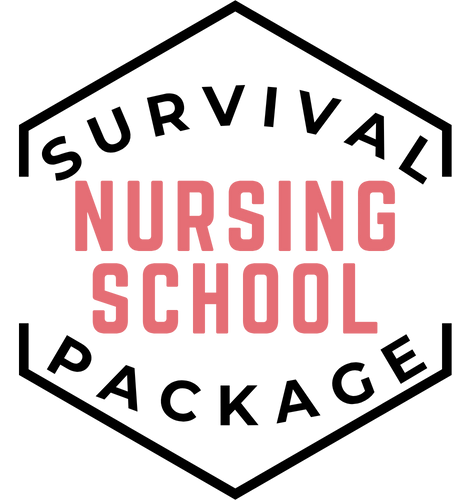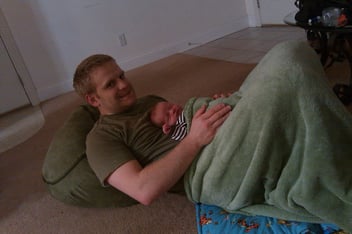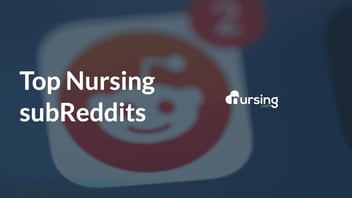Why You Should Feel Scared for Your First Nursing Job (and how to deal with it) | NURSING.com
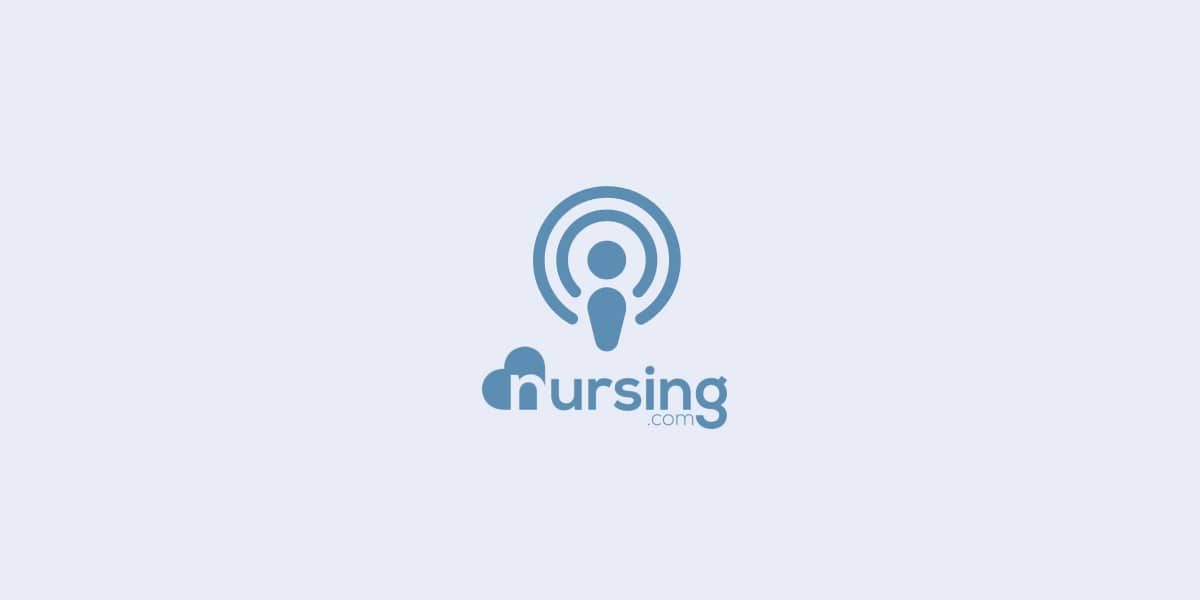
I can still remember my first shift. . .
I arrived to the Neuro ICU about 5 minutes late, sweating, out of breath, and flustered . . . not to mention nervous, scared out of my mind, and excited!
What a way to start my career as a nurse, right?
My initial plan was to arrive 30 minutes early, look up my patients, and try to feel prepared for the shift . . . things didn’t work out that way and I ended up stuck in traffic for nearly two hours.
Will I Be a “Good” Nurse?
Last night I was reading the Show Me Your Stethoscope Facebook group page and saw this honest and humble post from a new nurse:
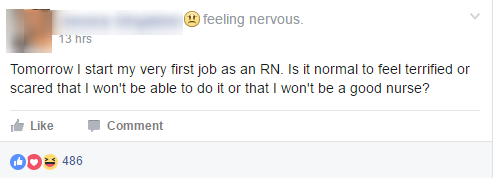
My initial thought was: Wow, I wish I could be her preceptor. We need more nurses like her.
This post is full of so much humility, honestly, and excitement.
But then I began to read the comments and found that there were MANY nurses and nursing students that struggle with the same feelings of doubt, fear, and anxiety . . . some to the point of not even applying for a job after finishing nursing school and passing the NCLEX®.
So I decided I wanted to make an episode to address not only the fact that it is normal to have these fears but why it is important.
Tomorrow I start my very first job as an RN. Is it normal to feel terrified or scared that I won’t be able to do it or that I won’t be a good nurse?
Is It Normal to be Terrified for Your First RN Job?
In a 2008 study by the Journal of Advanced Nursing they found the following:
New nurses often identify their initial professional adjustment in terms of the feelings of anxiety, insecurity, inadequacy and instability it produces.
In other words, most new nurses use words like:
- anxiety
- insecurity
- inadequacy
- instability
to describe their feelings about their first nursing job.
It is scary and hard to make the transition from “theory” to “real life”. It is hard to take all the knowledge you have gained in nursing school and try to figure out how to apply it to your role as a nurse.
A Few Words of Confidence
It is important to look at everything you have done to reach the position you are in . . . to reach a place where you have secured your first job as a nurse.
You have:
- Been accepted to nursing school (31-37% of qualified candidates are rejected)
- Passed nursing school (attrition rates are as high as 33%)
- Passed the NCLEX® (only 84% of first-time US test takers pass)
- Been offered a job (my hospital gets 400-800 applications for only 20 ICU spots less than 5% are offered a job)
Based on these numbers . . . you are one of only 3 out of 100 nursing students who start nursing school that has been offered a nursing job!
That’s impressive . . . you are literally the cream of the crop. Be confident in YOU.
Are You Ready to Be a Nurse?
In a word . . . NO . . .
But . . . you are QUALIFIED
Let me expound.
There is a massive canyon that exists between nursing school and BEING a nurse.

This canyon exists for many reasons . . . nursing units are specialized (you can’t learn everything NEURO in nursing school), you haven’t been exposed to very much clinically, it is impossible to know everything.
Good hospitals have identified this canyon and have implemented preceptorship or internship programs to help new nurses transition.
This time is important to help you bridge this gap. A 2003 article in the Journal of Nursing Education found that internships provided new nurses with the ability to find their own rhythm:
Finding a rhythm brought graduates confidence and feelings of accomplishment, and self-reflection emerged as an important and integral part of the transition process. Despite the challenges and stress of orientation, graduates found great meaning in their work, and most expressed readiness to be on their own by the end of 12 weeks.
Are You Growing?
Regardless of how long you have been a nurse there will be many shifts that you simply feel over your head.
Growth occurs when you reach the EDGE of your comfort zone and then take a step into the dark.
"Growth occurs when you reach the EDGE of your comfort zone and then take a step into the dark."
Click to Tweet

There will always be shifts, patients, situations, etc that require you to grow. This is an integral part of life and nursing.
Nurses that stop striving for growth are dangerous.
What I am trying to say is . . . that starting this new job is the step into the dark that will allow you to grow. You can’t stay a nursing student forever (and who would want to).
As you make the scary step into the hospital for that first shift you a literally growing and becoming a better, stronger, and more confident nurse.
Would You Turn Down $5,660?
Some new nurses mentioned that the fear and anxiety of starting a new job has stopped them from applying for jobs in the first place.
Let me offer a thought on this.
The average nursing pay in the US is $32.66 an hour.
That comes out to $5,660 a month.
That means that if you delay your job search by even just one month you are essentially turning down $5,660!
And each month you delay working means that you delay your career goals by a month.
And, get this, by DELAYING starting a new job you DO NOT get rid of the anxiety of STARTING.
The same fear, anxiety, and doubt will exist no matter when you start your first nursing job.
Embrace the Fear
I know, I know, this is the sappy stuff, but I mean it . . . learn to embrace the fear of being a nurse.
We all learned in psychology about eustress vs distress . . .
Eustress is a form of stress that motivates and moves us. Learn to embrace the fears associated with starting your first nursing job and face them head on. You can use the fears to help you be more:
- Cautious
- Alert
- Aware
This means you respect what it means to be a nurse . . . it’s more than an abbreviation.
Head-to-toe-Assessment
6 Tips for Your First Job
Here are 6 quick tips and areas to focus on to help you excel in your first nursing job:
- Develop a rhythm (focus on charting, timing, eating, etc)
- Organize your life around nursing (learn when to sleep, when to rest, how to make life work as a nurse)
- The Job! (during internship . . . focus on learning the job)
- How to talk to patients, docs, and families (this is a big part of the job)
- Hospitals are small places (people will get to know you, make a good name for yourself)
- Respect others (CNAs, RT, housekeeping, maintance, docs, everyone)
Conclusion
Nursing is a tough profession . . . it takes a lot to be a nurse and it is hard to transition into that first job . . . but it is possible and being nervous is a sign that you respect what you are doing.
Landing Your First Nursing Job Right Out of School with Nurse Beth from NurseCode.com
I am excited to have Nurse Beth who runs the blog NurseCode.com and also Ask Nurse Beth on AllNurses.com share with you some tips on getting your first nursing job. I personally can’t think of a more well rounded and qualified nurse to share these insights with you. By following these 9 steps you will no doubt have much greater success in finding your first nursing job. . . . Enjoy! –Jon Haws RN CCRN
The Assignment No One Gave You
Tiffany studied hard all through her nursing program even though she suffered with test anxiety. She succeeded in all of her classes thanks to her sheer determination and hard work. She passed her NCLEX with seventy nine questions and proudly practiced writing “Tiffany Brown, BSN, RN” after her name. Graduation day was one of the best days of her life.
Fast forward six months and Tiffany still has not landed a job. Here’s what no one told Tiffany and the most important assignment she was never given.
I hate to see nursing students work so hard for years and triumphantly graduate…only to struggle when it comes to landing a job.
In nursing school, there is an assignment that your instructors never gave you. It’s called “How to Make Sure You Land a Job” and the homework is outlined below.
Here’s what a lot of nursing students don’t know- you can greatly increase your chances of landing your first RN job, if you start strategizing right now while you are still in school.
"You can greatly increase your chances of landing your first RN job, if you start strategizing right now while you are still in school."
Click to Tweet
Here’s why:
The challenge to getting hired in today’s market is to set yourself apart from all the other equally qualified applicants. You can do it if you start now!
Trying to find a “New Grad Nurse” job like . . .
Start Your Portfolio
Obtain letters of recommendation on school letterhead from your clinical instructors now. Your instructor feels most positive about you and most connected to you immediately following a clinical rotation. Don’t wait to request a letter of recommendation.
Letters from clinical instructors are highly valued by hiring managers because they know your clinical instructors have seen you perform under stressful circumstances.
Remember, too, that clinical instructors have strong ties to local hospitals. Many of them work in local hospitals, know many hiring managers, and can put in a good word in for you.
Volunteer
Volunteer for any possible community/health-related/school project you can. Better still, lead a project.
For example, volunteer at a booth at the county fair to take blood pressures or perform fingersticks. Participate in Toys for Tots at Christmas time. Create a “Volunteer” header on your resume with a list of your volunteer activities. The candidate with volunteer experience may well win out.
I once was part of a selection committee to award an externship spot. It was narrowed down to two candidates, both essentially equally qualified. The deciding factor came down to the one with the most volunteer work on his resume.
Serve as a Class Officer
Run for an office. Holding an office demonstrates both service and leadership.
Join and become involved in the National Student Nurses Association (NNSA). It shows professionalism. Student nurses who belongs to NNSA are more likely to understand the importance of joining a professional nursing association down the road.
Keep a Record of Stories
As a student, you will have many experiences that you will find moving, or that change you, or that you learn from. These are the cases and situations you talk about in post-clinical.
Later on, during your interviews, you will need to recall a story. For example, you may have had a time when you went above and beyond for a patient or a family member, or perhaps you resolved a conflict.
Have stories on hand because stories are remembered- which makes you memorable. Telling a short story of how you stayed up late to help a classmate pass a crucial test is far more effective than saying “I’m a team player.”
Track Accomplishments
Make note of any awards, recognitions, speeches given, and so on. These help you to stand out. Were you voted “Most Collegial”? It’s an accomplishment! Put it on your resume.
Resumes should highlight accomplishments.
Network
Make and keep connections with nurses you meet or who you are assigned to in clinic. Exchange phone numbers and ask if you can stay in touch. The clinical bedside nurse you worked with in second semester may be a hiring unit manager by the time you graduate!
Work as a CNA
Here’s the big one. This one almost guarantees you will be at the head of the line when new grad RN jobs are given out.
Identify the hospital you want to work in when you graduate. Hire on as a nursing assistant or PCT. In most places, you do not need your nursing assistant certification after your first semester of nursing school as you are qualified to be a CNA. Work during school breaks, over holidays, and weekends.

Here’s the secret- you are not doing this for the experience, although it is valuable. You are auditioning for your future RN job. As you get to know the coworkers on your floor, they are also getting to know you. Be an exemplary employee. Be on time, offer to help others, be friendly. Your work ethic will not go unnoticed. Let people know you’d love to work there after you graduate.
Hiring managers always prefer to hire someone they know over someone they don’t know.
Thank You Note
Following each clinical rotation, write a short, handwritten note to the unit manager. Tell them how much you enjoyed your experience on their wonderful unit, and mention one person in particular who was helpful to you or who served as a role model.
Here’s an example:
Dear Jonathan,
Thank you for the opportunity to spend my Med Surg clinical rotation on your unit. Jessica was especially helpful and made me feel like part of the team. I aspire to work on a unit such as this someday. I especially enjoyed placing my first NG tube.
Sincerely,
Melissa Brown
Make sure your name is legible as you want Jonathan to recognize and recall your name. Do not be surprised if you drop by Jonathan’s office at a later date and see your note tacked up on his bulletin board. With your name.
Not many students will write a thank you note, so you have successfully already stood out from the others.
Keep your GPA Up
GPAs do matter. In a competitive market, a high (3.75 or >) GPA helps you to stand out. It could come down to a tie-breaker between you and another candidate. The candidate with the higher GPA will get the interview.
Best of luck in your journey, and be sure to read more about resumes, interviews and job searching at nursecode.com
Vulnerability and Confidence as a New Nurse with Kati Kleber
Kati Kleber with NurseEyeRoll.com is one of my favorite nurses.
Kati and I discuss vulnerability and confidence in nursing and how to develop both as a nursing student and a new nurse.
Sadly, there is a vibrant culture of shame and doubt within nursing. Nursing school and starting as a new nurse is a very vulnerable time . . . in this episode we talk about how to develop confidence in yourself, why it’s okay to feel doubt, and how to use the vulnerability to grow as a nurse.
Transitioning from New Grad to “Nurse” (with @thenursejennifer)
Making the change from a new grad to a “real nurse” is extremely hard. Jennifer helps guide us through the process.
Jon:
Welcome to another episode of the nursing.com podcast. My name is Jon Haws, RN. And I’m your host today? I have a very special guest. This is the nurse, Jennifer, over on Instagram. If you want to meet her, but more importantly, if you want to meet her in person, along with other podcast, guests and myself and the nursing.com team, you need to come to nursing live on June 6th and seventh in Allen, Texas. This is going to be such an incredible event where you can meet nurse celebrities. You can meet the nursing.com team and you can get motivation and inspiration for your nursing journey. Go over to nursing.com/live that’s nursing.com/live to learn more. All right, let’s jump into our episode and with my guest, Jennifer Matthews you might know her on Instagram as the nurse, Jennifer. Thanks for coming on Jennifer.
Jennifer:
Thank You so much for having me. I’m definitely excited to be here.
Jon:
Yeah, so Jennifer and I met maybe, I don’t know, a couple of years ago through Instagram and had conversations back and forth and then were able to meet in person in Chicago, maybe about a year and a half ago when you were, I guess what, six months from graduating or less
Jennifer:
Something like that. Yeah, it was fairly close to graduation. So tensions were high, especially with finishing nursing school and collect. So it was definitely nice to get a break from that to go meet you and definitely promote the nursing or the, it was interested in GA
Jon:
Then the old-school. Yeah. So yeah, you were I know it was your life. It was, I think it was like your last semester you’re doing that and you were planning a wedding and you were looking for jobs, pamper and collect. So it’s not like yet anything going on, but yeah. So, so talk about maybe a little bit about you and then maybe why nursing and kind of a little bit about where you’re at now?
Jennifer:
Well, so I graduated from Chamberlain university, I think is what they call it now. December or January of 2019, I accepted a new grad position at an emergency room in March. So that’s when I started. So I’m coming up on a year now. And I’ve been working there since it’s just been awesome. I’ve learned just so much about myself and then just what it takes to work with a team and just thinking on the fly with, you know, pulling out critical information for patients and really tying back to things I’ve learned in nursing school and it’s like the real world. So it’s been really cool just to see that progression of like how nursing school has applied to like my job.
Jon:
I think I, I liked that you mentioned that kind of that personal growth, not a lot of people talk about that. And I always talk about the knowledge growth that happens, but you know, when you mentioned that it is in nursing school, you don’t really get that team nursing experience. You’re doing clinicals individually. You’re taking tests individually, but when you come out, if you don’t have a good team, you’re, you’re really kind of screwed. Right.
Jennifer:
Right. And I think I was, I know it was just it’s. I, like you said, this nursing school, it’s like, you can study with people in teams, but it’s like, you’re the one that’s being assessed personally for that, but really in the emergency room, like you rely on such a strong team, like in having that teamwork with the doctors, the PAs, other nurses, and all the texts and give respiratory, and it’s just a great environment to be in and just see how everyone can come together with their different knowledge bases and then how you can improve based on like other people’s like performance. Like, oh, that’s an interesting thing. I should take it into my practice. So it’s been very enlightening to come to that realization with having a team. That’s just awesome.
Jon:
So talk about, a little more about why nursing, why did you choose nursing and then did you choose the ER, did it happen?
Jennifer:
Oh geez. So as a little girl, I always grew up knowing I wanted to be like something in the medical field. I went through high school, I took all the CNA anatomy classes. And then I think it was during my CNA course, like halfway through. I had the intentions of going to medical school to become a pediatrician. I really liked working with kids. But then when I was doing like one of my clinicals, I was like, you know, it’s kind of, not my thing. Like it’s really kind of cool just to be with patients a lot more and you get more interaction with them and it’s just different thinking skills. And like another big detractor for me with going to medical school was the cost. But nursing school, it just really appealed to me. And so I knew it was just something I wanted to do.
It was just without a doubt. I didn’t have any family members that were in the medical field. So for me it was kinda like, okay, I’m going to take this step towards becoming a nurse. So I walked into nursing school kind of like, well, you know, the, or interests me. Pediatric nurses, you know, interests me working with kids. The emergency room really kind of interested me, but I really didn’t know what I wanted to do up until, like I had gone through all my clinicals. I think one of my first rotations was med surge and I was in this very small emergency room is for one of my clinical days. And not much happened as the hospital put it. Yeah. We’re just kind of like a, an immediate care. Sometimes it’s not super big. We don’t get a lot of critical patients.
And it’s funny cause my husband actually will take patients that hospital. I did clinical set, so he’s like, yeah, it’s just a glorified immediate care. So it wasn’t a true like ER experience. And that’s why I kept telling people. So when I got closer to like my capstone and collaborative semesters, we had the opportunity to pick out what we wanted to do with like, they would try their best to place us within a certain floor interests that we had. So I put in for the ER, I didn’t get it the first go around for collaborative, but then the advisor called me one, he’s like, Hey, there’s an ER spot. It’s at a level one trauma center. Do you want it? I’m like, sign me up. Let’s do it. So I did my capstone there. It was just completely eye-opening. I loved the fast pace.
Especially from coming from like working on a med surge floor. It was just kind of like, I love running around. So, and like I said, like working on a med surge floor, it’s kind of like you answer call lights, you take food trays out. Like, yes, that’s basic nursing things. But for me, I, I don’t have a hard time sitting still, but for me I just, I have to keep moving. I like always being on the fly with things. So that’s how I knew kind of like the emergency room was definitely for me. Just, and then not only that, but like having different types of patients, you can have pediatric patients, you can have a med surge, ICU. There’s a lot of like OB GYNs, you know, Gagne issues that come through. And it’s just, it’s really cool to use everything that I’ve kind of learned in nursing school and just throw into one department and use all those skills.
Jon:
Yeah. That’s the kind of the cool thing about it. I, I never rotated or worked in the, in the ed, but I would go down there a lot, you know, as critical patients were coming in, we were trying to get in to get an idea of what was going to come up to the ICU. And that’s kind of cool about it is, you know, I, I was neuro ICU, so was specialized inside a specialty and really kind of saw one kind of patient. And I think in ed, you know, you do have to keep that broad set of knowledge there. I was able to forget OB entirely and I threw my book away when I graduated, but an ed, like you got to stay up on it enough to receive those patients and move them along. Right.
A lot of, a lot of students consider ed and ICU. They’re like, I want to work ed and ICU, but I, everyone tells me I have to do med surge first. What is your take on that? Okay.
Jennifer:
Oh gosh. Okay. So let’s kind of rewind a little bit. So I was a med surge tech, and then I was offered an RN position. I worked there for probably three weeks before I went into the ER position. I’m kind of, it’s really hard to say cause I was in that spot, but I don’t think it’s necessarily necessary to go right into a med surge position to get into a specialty that you’re interested, ICU med ER, or OB I just break, I think just break that barrier because I jumped right into the ed and I was full for, you know, just all for it. And I’ve learned a lot of things without having to have that med surge experience. So I know a lot of employers like want people to do that. But there’s really no hard set rule that you have to do that. So,
Jon:
And I agree with that too, because if, if, if I had gotten a job in the med surge unit, just so that I could get that experience or whatever, I don’t think I would have lasted more than six weeks. Like I knew I wanted ICU. And so getting that start there allowed me to have more passion for it. And same with you, like you knew you wanted ed working anywhere else wouldn’t have been getting you started where you want it to be. It’s a such a different job between the different departments.
Jennifer:
Definitely.
Jon:
So talk about maybe you’re, you’ve just finished up your first year as a nurse. Have you felt that transition, you know, they talk about from like now you feel like a real nurse yet.
Jennifer:
So I had, I think close to 12 or 16 weeks of orientation and coming off of it, like, it was kind of like that still like that baby nurse, like I have my training wheels still on. I came off orientation feeling completely like overwhelmed. Like, oh my gosh, I’m going to fail at this. I’m not going to do well. Like where’s my preceptor. I needed some resources. I didn’t really feel, I mean, I felt comfortable with my job, but I didn’t feel as comfortable as I did or as I do now. Cause I did have a bit of a shift change. I was a one-to-one nurse, but then he went from 600 to six P. So when I finally got into that schedule with waking up in the morning and going right to work, that was really kind of like, I can do this.
Like, this is like my job. I feel like I’m confident with what I’m doing. I think that was really kind of like that setting stone for me. I think it was about six months after I finished. I started the job that I really felt confident with my skills. It wasn’t necessarily like a year later, I guess, to your question. I think it was more like close that six months where I was like, yeah, I can do this. I think this is what’s for me. And I felt really good going to work. It wasn’t like I was dreading it or anything like that. So
Jon:
Exactly.
Jennifer:
And like I knew in the back of my head, I had resources to go to. I could always go to my charge nurse. I could ask all of my coworkers and like some of the texts when I was first off orientation, like, Hey Jen, did you want to do this? Kind of like prompting me to like, do like assessments. I’m like, oh yeah, you’re totally right. Like, let’s do this.
Jon:
I think too, like to that last point you made, what helped me a lot was, was an intern earn orientation. I had, I think it was nine weeks or something in ICU. And I had a really good preceptor who if we got our patients stable, she would take me around all over the hospital trying to find the craziest thing so that I had a chance to see everything. Yeah. Like, we’d go all over the place. Anytime there was a code anywhere in the hospital, we went to it, you know, just to give me as much exposure while she was right there. And then even as I came off, I kept looking for those hardest cases that I hadn’t done yet. And I think doing that helps you begin to feel more competent because if you can do that crazy stuff, I can take care of a regular patient, you know, no problem. Right. so talk about it a little bit with nursing lives. So you’re going to be coming to our conference this June 6th and seventh and discussing, we’ll talk a little bit about it and what you’re going to talk about.
Jennifer:
So yes, I will be coming down to Texas. I am super excited to leave Chicago at least for a little bit. But one of the things that I am going to be kind of talking about is just more of like the journey that I’ve had from leaving school, like that educational portion of that having, you know, like the studying the tests and then up through like kind of like my end clicks journey getting my license and then really, like, I think my main focus will be just focusing on some of the challenges that I faced at work and then outside of work and kind of like mixing those two together as a new grad. So I really want to focus on like my tips and tricks and just little pieces of advice that I’ve found to be helpful in my first year as a nurse.
Jon:
Do you have maybe one that you can share now?
Jennifer:
Ooh. I would definitely say like fine. Like if you have a preceptor that’s great for your first year, but then I would find a mentor someone that you can, you know, go to with issues, go to with questions, someone you need to find an answer for. And that they won’t be super critical of you of, oh my gosh, you don’t know the answer to this that that’s not the person you want to be around just because you need to have like a positive environment and knowing that you have the confidence to just get through something that you’re struggling with. They should be open to helping you and opening to explaining things. And just being a person to look up to to kind of get to like where you want to be in your career.
Jon:
That’s a great tip. Have you ever been to Texas?
Jennifer:
I have not. I have actually never been south of, well, I think Florida is the furthest south I’ve gone to.
Jon:
All right. So we’ll do you eat barbecue? All right. We’ll have to get you some good Texas barbecue, so good. I’m not talking Dickies. You I’m talking like real barbecue.
Jennifer:
Okay.
Jon:
Cool. So that’s June 6th and seventh. You’re going to be here in the Dallas area where north Dallas and Jennifer is going to be here with a bunch of other nursing people. We’re going to have 500 people there to talk and just really kind of just get that confidence and stuff that, that, and the motivation is kind of missing while you’re going through nursing school. So where, where can people find you? And what’s kind of your message and everything on your platform.
Jennifer:
So my Instagram is at nurse Jennifer, or sorry at thought nurse, Jennifer. I can’t even, what is my name?
It is the nurse. Jennifer is totally spaced out. This is what happens when you work too many days in a row. So yes, I kind of took a little like social media break when I was going through all the wedding planning. And a lot of that was also due to trying to adjust to this life as a new, a new nurse, a new grad. And so I focused a lot on that. So I’m definitely trying to get back into the game of blogging again. I think I’m going to be like revamp it about looking back on like my nursing school journey, what I would’ve done differently, knowing what I know now. But then also just focusing on kind of like that work life balance of working as a nurse, but also trying to maintain a very healthy lifestyle outside of work. Because as nurses, we do have a tendency to forget about ourselves when we take care of our patients. So I think that’s really important is to send that message across of, don’t forget to take care of yourself.
Jon:
I think that’s really, really important. I, I struggled with that in nursing school and as a nurse, because one thing I didn’t prepare myself for enough coming out of school was the emotional toll of seeing it every day. You know, just the, the bad things that happen in the world. You don’t see it until you’re really in the hospital. So yeah, I think those, those tips are going to be super helpful for people.
Jennifer:
Definitely.
Jon:
Cool. What else would you like to share as a parting piece of advice or encouragement?
Jennifer:
Oh gosh. If you’re kind of in this rut with the nursing school or you’re in a rut with trying to find a job, just take a breather you know, no that this is only temporary with nursing school or trying to find a job it’s only temporary. Don’t give up and just keep going for it. Is it, it’s totally worth it in the end, just finishing up nursing school, walking across that stage and getting that license. It’s amazing. And then starting your first job is totally awesome as well. So just don’t give up. I know it’s, it’s stressful. I’ve been there. I would never go back and just wait. I would just never go back and think I can never do this. It’s, it’s totally worth it. I would stick with it.
Jon:
Awesome. Perfect. Love it. Thank you, Jennifer.



